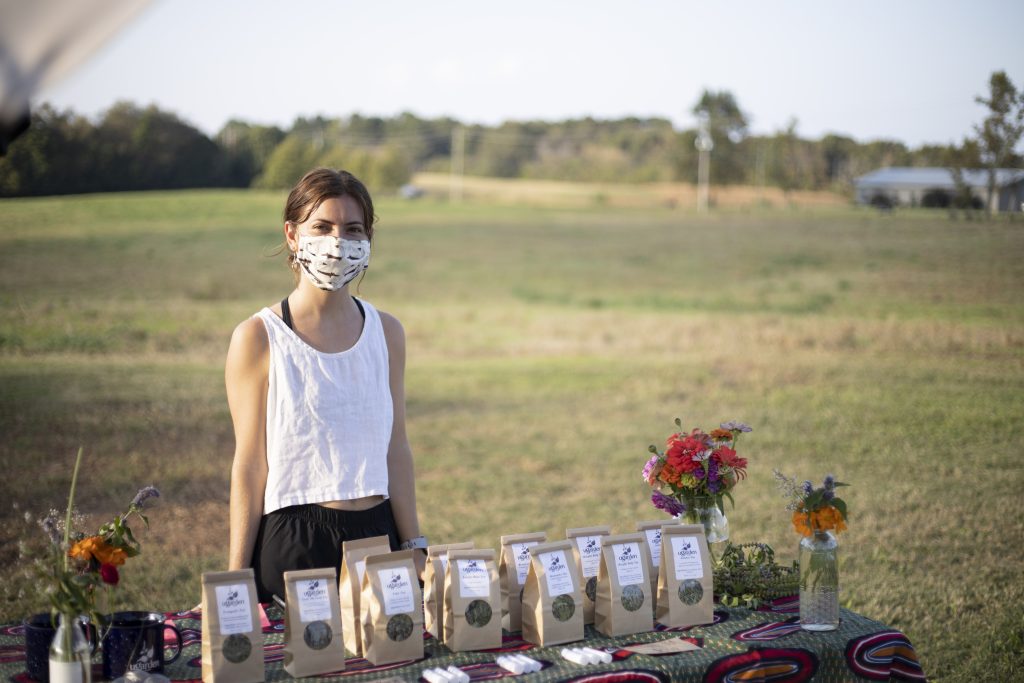
By Austin Clark for UGA CAES News
Balancing academic coursework with a job is a challenge many University of Georgia students face. But for students in the new Organic Horticulture Entrepreneurship class, their classwork is both academic and economic.
This semester is also harvest season for the four horticulture students in the class, who are gaining experience planning, planting and marketing their crops through a weekly student farmers market.
Taught by Associate Professor David Berle and Professor Tim Coolong in the Department of Horticulture, the new course in the College of Agricultural and Environmental Sciences (CAES) empowers students to learn the process of growing their own produce and build the interpersonal communication skills necessary to sell their crops.
Every Thursday
Every Thursday from 4:30 to 6 p.m., the students load up tables at UGArden with the crops they’ve grown during the semester — leafy mounds of lettuce, kale, turnip greens and bok choy, as well as radishes, turnips and teas made from herbs they’ve grown — and sell their wares to the public. Customers are able to buy field-fresh produce and the students practice educating members of the Athens community about the process of organic farming.
The class, which is being taught for the second time this semester, was created after Berle, who focuses on organic horticulture, and Coolong, a vegetable specialist, were approached by a donor interested in supporting the development of an immersive course addressing both sustainability and entrepreneurship.
Part of the donor funding goes to compensate Sarah Rucker, assistant farm manager for the UGArden.
“(Rucker) is the one who helps coach the students and manage the farmer’s market,” Berle said. Through her role in the course, Rucker essentially serves as a teaching assistant for the course by answering any questions the students may have about their crops, best practices and marketing techniques.
Course Adjustments
As the course progresses, Berle continually makes adjustments to give students the best opportunities to gain experience in both growing and selling organic produce.
One tweak is the way students sell their produce. During the first semester the course was offered, students were selling primarily to university vendors such as UGA Dining Services and the University of Georgia Center for Continuing Education & Hotel. But after realizing that students were missing out on face-to-face interaction with customers, Berle and Coolong combined their class with the weekly UGArden farmers market so that students could interact directly with consumers rather than just delivering to vendors.
Students Appreciative for Opportunity
Students in the course are grateful for the opportunity to give back to the Athens community by providing fresh produce while learning what it takes to be an entrepreneur in the organic horticulture industry.
“I am probably out here (in the garden) for four or five hours every day,” stated Sarah Kate Duncan, a senior horticulture major who is taking the course. “But it is totally worth it … Some of my favorite things to grow are turnip greens, different types of lettuces, fresh cut flowers and herbs.”
Another student in the course, Erica Head, works as the student assistant herb manager for UGArden.
“I see the whole process from beginning to end: I seed the plants, I put them in the field, I dry and process them into teas. I like seeing people enjoy the teas and telling them about their medicinal effects,” Head said. “It’s also really good to see the other students selling the crops they have worked hard on all semester.”
Chris Rhodes, director of industry partnerships at CAES, explains that industry leaders are looking for graduates with the creativity, communication and problem-solving skills that students in this course are gaining.
“There is no substitute for running a business to learn how to run a business,” Rhodes stated. Through his role in the college, Rhodes wants to ensure that every student has the confidence to recognize a path they want to achieve and then to be connected to resources to ensure success after their time at UGA.
Produce Availability
Student-grown produce from the course will be available through the weekly farmers market until Thanksgiving. For more information on this course and other experiential learning opportunities available at CAES, visit caes.uga.edu/students/experiential-learning.









